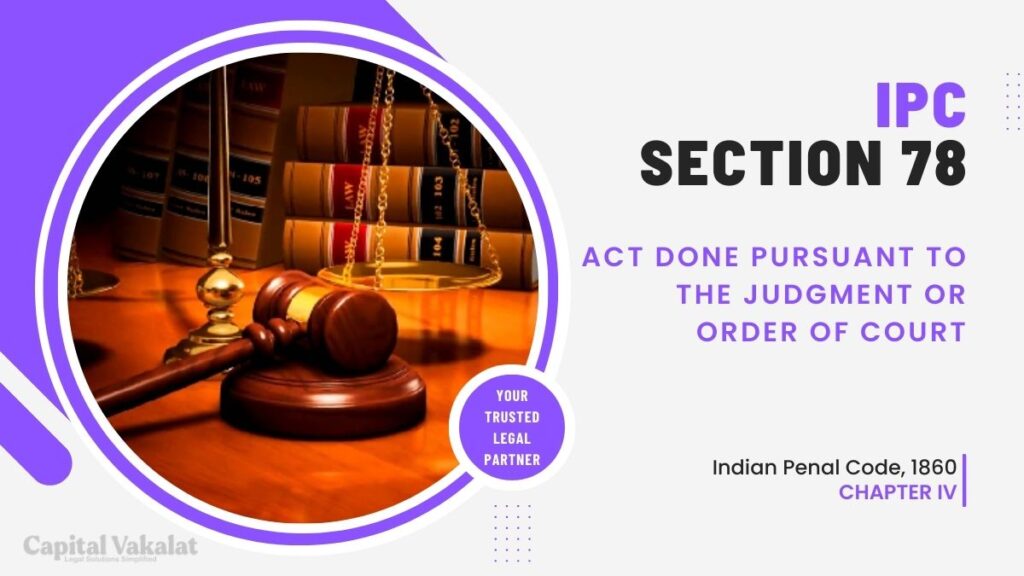In the realm of the Indian Penal Code (IPC), Section 78 stands as a significant provision that addresses acts carried out in accordance with the judgment or order of a court. This legal clause plays a pivotal role in ensuring that actions taken within the boundaries of the law and under the directive of a court are shielded from criminal liability.

In this comprehensive article, we will delve into the intricacies of Section 78 IPC, exploring its implications, exemptions, and its vital role in upholding the principles of justice.
Understanding Section 78 IPC
The Genesis of Section 78
To comprehend the significance of Section 78 IPC, it’s essential to understand its origin and the purpose it serves within the Indian legal system. This section derives its roots from the broader framework of the IPC, which was first enacted in 1860 during British colonial rule.
Legal Immunity Granted
Section 78 IPC essentially grants legal immunity to individuals or entities for actions performed as a direct consequence of a court’s judgment or order. This immunity extends to various situations, ensuring that those involved in the execution of such orders are shielded from criminal prosecution.
The Scope of Section 78 IPC
Wide-ranging Applications
One of the remarkable aspects of Section 78 IPC is its wide-ranging applications. It covers a multitude of scenarios where individuals are compelled to act as per a court’s directive. These actions may encompass enforcement of court orders, property seizures, and more.
Safeguarding the Integrity of Judicial Decisions
This section serves as a safeguard to protect the integrity of judicial decisions. By providing immunity for actions carried out pursuant to court orders, it ensures that the orders are executed without fear of subsequent legal repercussions.
Exemptions and Limitations
No Blanket Immunity
While Section 78 IPC offers significant protection, it’s important to note that it does not provide blanket immunity. Individuals must adhere strictly to the terms of the court order, and any deviation may result in potential legal consequences.
Discretionary Powers of the Court
Courts hold discretionary powers when issuing orders or judgments. Section 78 IPC does not absolve individuals from responsibility if they carry out actions that exceed the scope or intention of the court’s directive.
Case Studies and Precedents
Balancing Justice and Legal Immunity
The court’s role in balancing justice with legal immunity is crucial. The jurisprudence surrounding Section 78 IPC has evolved over the years to strike a delicate equilibrium between ensuring justice and protecting those acting under court orders.
Contemporary Relevance
Evolving Legal Landscape
In today’s ever-evolving legal landscape, Section 78 IPC remains a cornerstone of ensuring that the judicial system operates smoothly. It provides the necessary confidence to individuals and authorities to execute court orders effectively.
Upholding the Rule of Law
Ultimately, Section 78 IPC contributes significantly to upholding the rule of law. It reinforces the idea that court orders are binding, and those entrusted with their execution must do so without fear of personal consequences.
Conclusion
In conclusion, Section 78 IPC stands as a vital provision in India’s legal framework. It not only protects individuals from criminal liability but also plays a crucial role in maintaining the integrity of the judicial system. This section ensures that justice is served without hesitation, allowing the wheels of the legal machinery to turn smoothly.
FAQs
Can individuals misuse Section 78 IPC for wrongful actions?
Section 78 IPC is designed to protect those acting in accordance with court orders. Any misuse or abuse of this provision may lead to legal consequences.
What happens if a court order is ambiguous?
Courts are responsible for issuing clear and unambiguous orders. If an order is unclear, individuals should seek clarification from the court before taking any action.
Are government officials exempt from legal action under Section 78 IPC?
Government officials, like any other individuals, are protected by Section 78 IPC when acting in compliance with court orders. However, this protection is not absolute and may have limitations.
How can one challenge the validity of a court order under Section 78 IPC?
Challenging the validity of a court order falls under a separate legal process. Individuals should seek legal counsel and follow the appropriate legal procedures to challenge any order they believe to be unjust or unlawful.